On a series of personal traits, voters say Clinton, rather than Trump, is better described by the phrases “personally qualified to be president” and “would use good judgment in a crisis,” but neither candidate holds an edge when it comes to the dimension of “honest and truthful.”
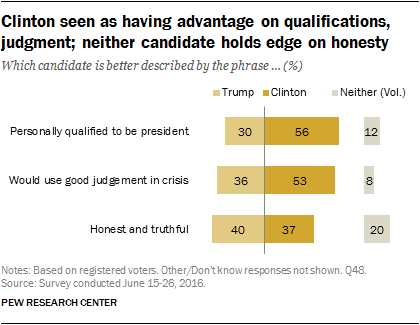
Overall, 56% of voters say Clinton is better described by the phrase personally qualified to be president, compared with just 30% who say this better describes Trump. Clinton also enjoys a wide edge over Trump on which candidate would use good judgement in a crisis (53%-36%).
About as many say Trump is better described by the phrase honest and truthful (40%) as say this better describes Clinton (37%); 20% of voters volunteer that this phrase describes neither candidate.
As with views on the candidates’ ability to handle issues, there are differences in perceptions of candidate traits within both parties by primary preferences.
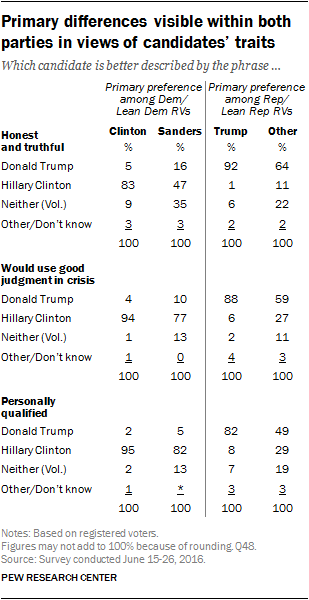
Among Republicans and Republican leaners who did not support Trump in the GOP primaries, 49% say Trump is better described as personally qualified, while 29% say Clinton is and 19% volunteer that the phrase describes neither candidate. By contrast, 82% of Republicans who supported Trump in the primary say he is the candidate better described as personally qualified.
Republicans who did not support Trump in the GOP primary are also less likely than those who did to view him as the candidate better described as honest and truthful (64% vs. 92%) and able to use good judgment in a crisis (59% vs. 88%).
Among Democrats and Democratic leaners, 83% of those who supported Clinton in the primaries say she, rather than Trump, is better described as honest and truthful; just 47% of Democrats who supported Sanders say the same. Democratic voters who supported Sanders are also less likely than Clinton primary backers to say she is the general election candidate who is personally qualified to be president and would use good judgement in a crisis; nonetheless three-quarters or more say Clinton is better described by each of these phrases than Trump.
More feel they know Clinton’s issue positions than Trump’s
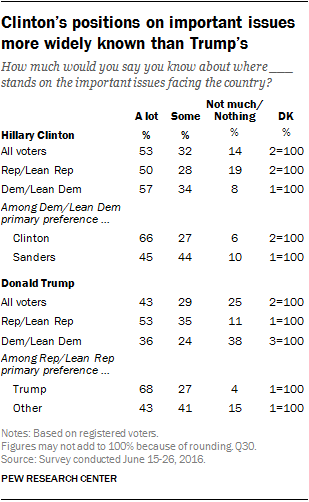
Voters are more familiar with Clinton’s positions on issues than they are with Trump’s: 53% say they know a lot about where Clinton stands on important issues facing the country, while 43% say they know a lot about Trump’s positions.
Though most voters say they know at least some about where both of the candidates stand, 25% of voters say they know not much or nothing about Trump’s stances. Only 14% say this about Clinton’s views.
Half of Republican voters (50%), along with 57% of Democratic voters say they know a lot about where Clinton stands. There is a more pronounced partisan gap in views of Trump’s positions: About half of GOP voters (53%) say they know a lot about his positions; just 36% of Democratic voters say this.
Within both parties, those who supported the presumptive nominees are far more likely to say they know a lot about their positions than those who supported other candidates in the primaries. Roughly two-thirds of Clinton’s (66%) and Trump’s (68%) primary backers say they know a lot about their nominee’s positions. By contrast, just 45% of Sanders supporters say they know a lot about Clinton’s positions. And a similar share (43%) of Republicans who supported a candidate other than Trump in the primaries say they know a lot about where Trump stands.
More voters say Clinton than Trump understands their needs
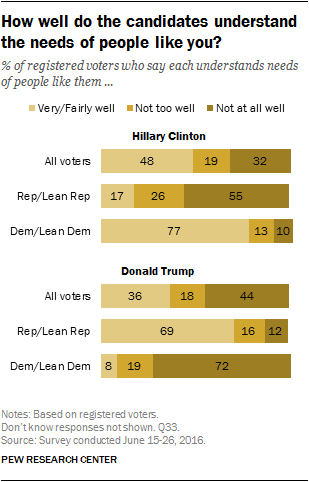
About half of voters (48%) say Hillary Clinton understand the needs of people like them very or fairly well, 19% say not too well and 32% say not at all well. Voters are more critical of Donald Trump’s understanding of their needs. Just 36% say Donald Trump understands their needs very or fairly well; 18% say he understands them not too well and more than four-in-ten (44%) say he understands their needs not well at all.
Roughly three-quarters of Democratic voters (77%) say Clinton understands their needs well, compared with 69% of GOP voters who say Trump understands the needs of people like them well.
Very few partisans say the opposing party’s candidate understands the needs of people like them. Just 8% of Democratic voters say Trump understands their needs; 17% of Republican voters say Clinton understands them.
Most Republicans say those in the party generally agree with Trump
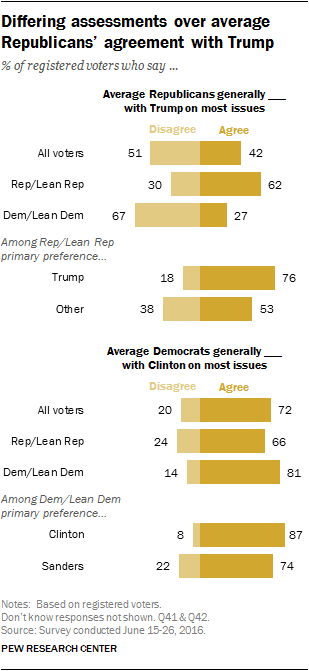
There are substantial differences in voters’ assessments of how well the presumptive nominees reflect the views of those in their respective parties. Overall, 42% of voters say that average Republicans generally agree with Trump on most issues, while 51% say average Republicans generally do not agree with him.
In contrast, by more than three-to-one (72% vs. 20%), most voters say average Democrats generally agree with Clinton on the issues.
Partisans differ in their views of how closely Trump’s views map to the views of ordinary Republicans. Roughly six-in-ten (62%) Republican and Republican-leaning voters feel that average Republicans tend to agree with Trump; 30% say they do not. Democrats, on balance, think average Republicans tend to disagree with the GOP’s presumptive nominee: 27% say average Republicans are generally in agreement with him; 67% say they are generally in disagreement.
About three-quarters of those who supported Trump for the nomination (76%) say Republicans as a whole are generally in agreement with Trump. GOP voters who backed candidates other than Trump in the primaries are more divided on this question. Nevertheless, more say average Republicans agree, rather than disagree, with Trump (53% vs. 38%).
Across the political spectrum, large majorities say Democrats are generally in agreement with Clinton. Fully 81% of Democratic and Democratic-leaning voters say this, along with 66% of GOP voters. And though Sanders’ primary backers are somewhat more likely than Clinton’s primary supporters to think average Democrats agree with Clinton on most issues, a clear majority of those in both groups (74% vs. 87%, respectively) say the Democratic rank-and-file generally agrees with Clinton on most issues.
Would Trump or Clinton change the way things work in Washington?
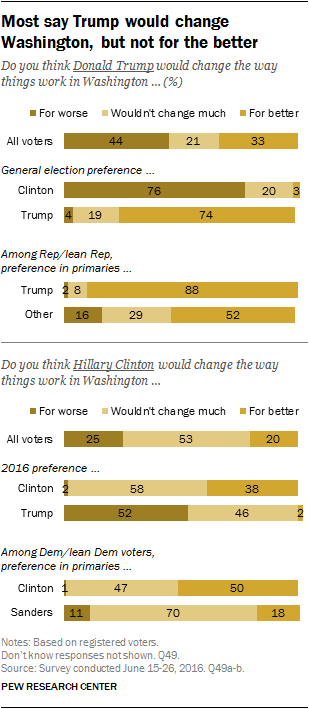
Voters are much more likely to say that Donald Trump would change the way things work in Washington than Hillary Clinton, but many think the change Trump would bring to Washington would be for the worse.
Overall, more voters think that Trump would change the way things work in Washington for the worse (44%) than for the better (33%); just 21% say they don’t think he would change things much either way.
Voters are much less likely to say that Clinton would bring change to Washington. Just more than half (53%) say Clinton wouldn’t change the way things work in Washington much at all. A quarter think she would change the way Washington works for the worse, while slightly fewer (20%) think she would change things for the better.
Among voters who support Trump in the general election, fully 74% say they think he would change the way Washington works for the better, while 19% say he wouldn’t change things much. By contrast, a majority of Hillary Clinton supporters (58%) say they don’t think she would change the way things work in Washington much, while 38% say they think she would change things for the better.
Views of the impact of Hillary Clinton’s gender
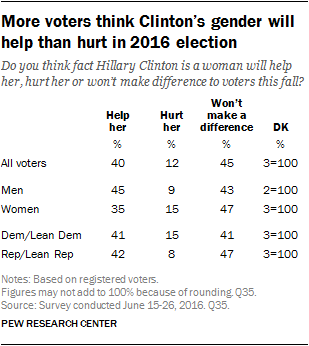
At the July Democratic national convention, Hillary Clinton is set to become the first woman nominated for president by one of the two major political parties. At this stage of the campaign, 45% of voters think that the fact that she is a woman won’t make a difference to voters this fall; those who say it will be a factor are much more likely to think it will help her (40%) than hurt her (12%).
There are modest differences in these perceptions between men and women voters. Overall, 47% of women and 43% of men say Clinton’s gender won’t make a difference to voters this fall; men are somewhat more likely than women (45% vs. 35%) to say Clinton’s gender will help her. And though few men or women think her gender will hurt her, this view is more prevalent among women than men (15% vs. 9%).




